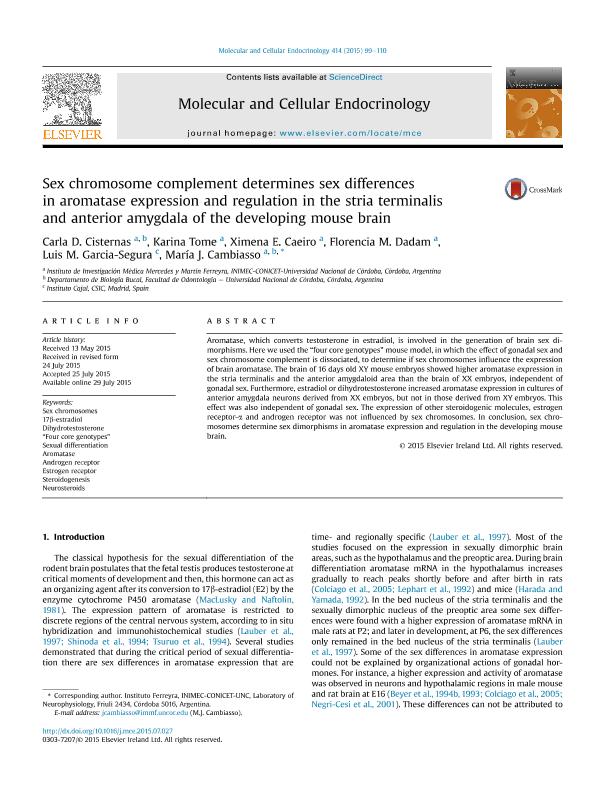Artículo
Sex chromosome complement determines sex differences in aromatase expression and regulation in the stria terminalis and anterior amygdala of the developing mouse brain
Cisternas, Carla Daniela ; Tomé, Karina; Caeiro, Ximena Elizabeth
; Tomé, Karina; Caeiro, Ximena Elizabeth ; Dadam, Florencia Maria
; Dadam, Florencia Maria ; Garcia Segura, Luis Miguel; Cambiasso, Maria Julia
; Garcia Segura, Luis Miguel; Cambiasso, Maria Julia
 ; Tomé, Karina; Caeiro, Ximena Elizabeth
; Tomé, Karina; Caeiro, Ximena Elizabeth ; Dadam, Florencia Maria
; Dadam, Florencia Maria ; Garcia Segura, Luis Miguel; Cambiasso, Maria Julia
; Garcia Segura, Luis Miguel; Cambiasso, Maria Julia
Fecha de publicación:
10/2015
Editorial:
Elsevier Ireland
Revista:
Molecular and Cellular Endocrinology
ISSN:
0303-7207
Idioma:
Inglés
Tipo de recurso:
Artículo publicado
Clasificación temática:
Resumen
Aromatase, which converts testosterone in estradiol, is involved in the generation of brain sex dimorphisms. Here we used the "four core genotypes" mouse model, in which the effect of gonadal sex and sex chromosome complement is dissociated, to determine if sex chromosomes influence the expression of brain aromatase. The brain of 16 days old XY mouse embryos showed higher aromatase expression in the stria terminalis and the anterior amygdaloid area than the brain of XX embryos, independent of gonadal sex. Furthermore, estradiol or dihydrotestosterone increased aromatase expression in cultures of anterior amygdala neurons derived from XX embryos, but not in those derived from XY embryos. This effect was also independent of gonadal sex. The expression of other steroidogenic molecules, estrogen receptor-α and androgen receptor was not influenced by sex chromosomes. In conclusion, sex chromosomes determine sex dimorphisms in aromatase expression and regulation in the developing mouse brain.
Archivos asociados
Licencia
Identificadores
Colecciones
Articulos(INIMEC - CONICET)
Articulos de INSTITUTO DE INV. MEDICAS MERCEDES Y MARTIN FERREYRA
Articulos de INSTITUTO DE INV. MEDICAS MERCEDES Y MARTIN FERREYRA
Citación
Cisternas, Carla Daniela; Tomé, Karina; Caeiro, Ximena Elizabeth; Dadam, Florencia Maria; Garcia Segura, Luis Miguel; et al.; Sex chromosome complement determines sex differences in aromatase expression and regulation in the stria terminalis and anterior amygdala of the developing mouse brain; Elsevier Ireland; Molecular and Cellular Endocrinology; 414; 10-2015; 99-110
Compartir
Altmétricas



